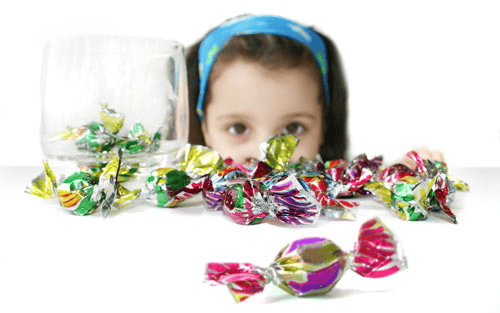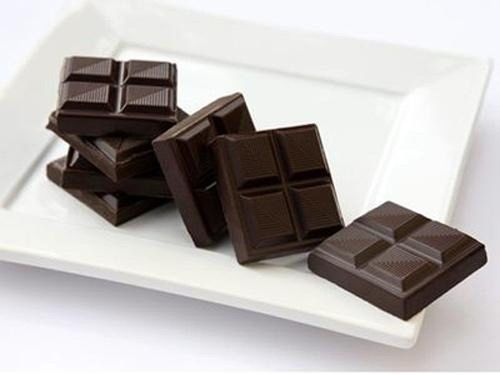This is an automatically translated article.
The article was professionally consulted by Resident Doctor Ho Thi Hong Tho - Neonatologist - Pediatrics - Neonatology Department - Vinmec Phu Quoc International General HospitalIt can be said that candy is one of the snacks loved by many children because of its taste and color. However, in fact, is it good to give your baby candy and when is the most appropriate time to introduce this food to your baby?
1. Candy and the reality of children eating candy
Young children should not eat candy. Because hard or chewy candies pose a choking hazard for children when used, and giving them other foods like chocolate can also contribute to poor eating habits as children get older.
Claudia Gonzalez, a registered dietitian in Miami, said: "We don't introduce our children to sweets, especially sweets and sugary sodas, at such a young age." And she always advises parents that if possible, limit sweets for as long as possible, maybe at least after 2 years.
Candy is full of empty calories, and you want to make sure your child eats more nutrient-dense foods by limiting their intake of sweets including candy. Children need a healthy diet to promote all the physical and mental development that is taking place in their bodies.
When you establish your child's eating habits and tastes early on, what you give them now affects them for life. Therefore, parents should help children have a healthy start in the diet to set the stage for healthy eating for a lifetime of children.
Parents need to remember, never give children hard candy like pepper candy, toffee, or bean candy before the age of 4. This type of candy can cause choking because it slides down the throat and the baby can't chew properly. Tiny pieces of chocolate that melt in your child's mouth can also be considered a special treat after age 2.

Có nhiều loại kẹo có khả năng gây nguy hiểm cho trẻ
Parents also need to make sure that anyone else feeding your child such as grandparents, babysitters or caregivers knows what foods are appropriate for your child.
Your child will soon realize the appeal of sweets, but you can help him make smart choices. “If you really want to give your child something sweet, give them ice cream or pudding,” says Gonzalez. At least those snacks have some calcium in them.
And you should also think about why you are giving your baby candy. If sweets tend to be a bonus in your home, consider healthier treats instead.
2. Concerns when giving children candy
2.1. Allergy concerns
As it turns out, on the Internet there are many different opinions on this matter. Once upon a time, chocolate was listed as a worrisome food for young children. Allergic reactions have been observed when giving candy to children and parents have been warned to exercise extra caution when giving candy to childrenBut in recent years, the The actual research is getting more and more clear and is suggesting that many of those suspected reactions could be the result of something in the chocolate like nuts or soy. Both are on the Food and Drug Administration's (FDA) list of the top eight food allergens. However, chocolate itself is rarely blamed for allergic reactions.
Furthermore, it's always important to read food labels, as well as talk to your pediatrician about any concerns you may have when you decide to give your baby candy. And whenever you introduce any new food to your baby, you should always be on the lookout for symptoms of an allergic reaction. These may include a rash, stomach irritation, or itching.
In severe cases, a food allergy can cause a child's tongue or throat to swell. In this case, you should get medical help right away.

Thành phần trong kẹo có chứa chất dị ứng sẽ gây sưng lưỡi
2.2. Other concerns
Allergies aren't a big concern when it comes to chocolate and babies, but is there something else to worry about?Parents should consider the nutritional value of chocolate. And a balanced diet is key for young children who are not yet eating a lot of solid foods. You don't want chocolate (or any other form of candy or sweet) to be a staple of your child's daily diet. Because too much sugar can contribute to obesity and diabetes, and other concerns can affect your baby's health now and in the future. Moreover, in matters related to teeth, the baby eating candy can have tooth decay or damaged tooth enamel.
Can you use candy as a rare birthday present? But on a typical day, don't make chocolate a regular part of your kid's balanced diet.
3. Time for children to eat candy
Parents should take the time to introduce new foods to their babies. That way, if there's a reaction to a new food ingredient, it's easier to figure out what's causing it and how to fix it. Most experts recommend that you don't give your baby sweets for the first year of life. If you want them to develop a preference for other, healthier foods than before.But in fact, there are no specific medical guidelines for introducing chocolate nor candy to babies. It is up to the parents to decide after the child has eaten solid food. But keep in mind that chocolate often contains some of the eight major allergens like milk so if you can limit your child's intake of these foods as little as possible..
If you are wondering. If you have questions about feeding your baby sweets in general and candy in particular, you can contact your pediatrician to get answers to specific questions about the best time to introduce a food. new for kids.

Ba mẹ nên cân nhắc việc cho trẻ ăn kẹo để tránh rủi ro
4. Introduce candy to children
Milk chocolate candy. The health benefits of dark chocolate are now well known. But even with some heart-healthy benefits, not all chocolate is created equal. Some chocolates are processed and contain more sugar than you think, and when you add foods to your baby's food, you're unknowingly giving them too many unhealthy sweeteners. So, before choosing a food you need to pay attention to the label and only providing chocolate in moderation in your child's diet will be the best key to building a healthy diet for children.Dark chocolate tends to have less sugar than milk chocolate, but not all children like the bitter taste of this food. Chocolate milk - a favorite of toddlers and older children, is it appropriate for young children? The answer is yes or no depending on the baby's body. This dish should not be introduced to children under 1 year old. Then, assuming the child doesn't have an allergic reaction to milk, chocolate milk is fine. But keep in mind that chocolate milk contains more sugar than a glass of whole milk. Again, parents need to remember that moderation is the key to making their kids' meals healthier.
A few ideas of candy recipes for babies. After getting your pediatrician's approval to introduce chocolate to your child, you may be wondering how to serve him. Here are some delicious and easy chocolate recipes to try. You can even make them with your baby in the kitchen.
Almond cake Chocolate pudding Chocolate cake

Ba mẹ có thể cho trẻ ăn socola thay thế kẹo
When a child shows abnormal signs of health, parents can take the child to Vinmec Health system for timely examination and treatment.
In addition to dietary supplements, parents can give their children support foods containing essential vitamins and micro-minerals such as zinc, lysine, chromium, selenium, ... to help fully meet their needs. nutritional requirements in children. At the same time, these essential vitamins also support digestion, enhance nutrient absorption, help improve anorexia, and help children eat well.
Please regularly visit Vinmec.com website and update useful information to take care of your baby and family.
Reference source: babycenter.com; healthline.com














